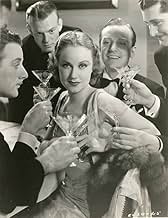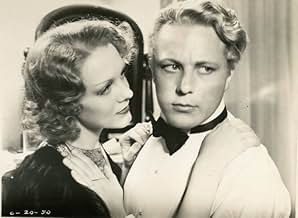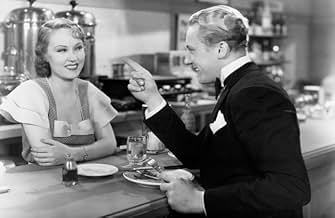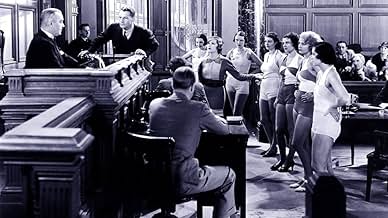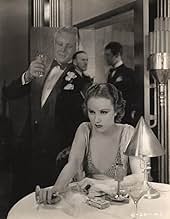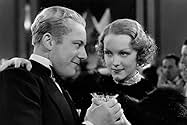After graduation from Hampden University, Bill "Lightning" Graham, a football star, and Ann Carver, who just passed her bar exam, marry. Instead of pursuing a career in law, Ann takes on the... Read allAfter graduation from Hampden University, Bill "Lightning" Graham, a football star, and Ann Carver, who just passed her bar exam, marry. Instead of pursuing a career in law, Ann takes on the role of housewife, while Bill is employed as a draftsman. When Ann is asked to take on a ... Read allAfter graduation from Hampden University, Bill "Lightning" Graham, a football star, and Ann Carver, who just passed her bar exam, marry. Instead of pursuing a career in law, Ann takes on the role of housewife, while Bill is employed as a draftsman. When Ann is asked to take on a high-profile legal case, she accepts and wins. She becomes an overnight success and a medi... Read all
- Andrew Simmons - Attorney
- (uncredited)
- Irma Chappelle
- (uncredited)
- Melville - Butler
- (uncredited)
- Baker
- (uncredited)
- Dinner Party Guest
- (uncredited)
- Dinner Party Guest
- (uncredited)
- Coroner
- (uncredited)
- Harrison
- (uncredited)
- Bill's Architect Co-Worker
- (uncredited)
- Bill's Lawyer
- (uncredited)
- Trial Witness
- (uncredited)
- Director
- Writer
- All cast & crew
- Production, box office & more at IMDbPro
Featured reviews
** 1/2 (out of 4)
Entertaining curio from Columbia has Fay Wray playing a wife turned brilliant lawyer who must defend her estranged husband (Gene Raymond) when he is accused of killing a nightclub singer (Claire Dodd). This is an extremely interesting little gem that manages to be entertaining as a film but also because of the way it showed women and race of the time. The husband ends up leaving the wife because she's making more money than him, which is something he's embarrassed about. Seeing a woman work here way up without using sexuality is something else not all that common from films of this era. The way the film views race is another interesting thing because Wray's first big trial is a black woman charged with dating a white man but not telling him she was black. This entire courtroom scene is rather jaw dropping as even blackface doesn't seen as out of date as this sequence. We see the attorney bring in "questionable" black women who might be white. The entire sequence is surreal, strange and certainly something you probably won't see in too many movies. The biggest problem with the film comes in the final ten minutes when the trial of the husband actually starts. The actual ending is a downright disaster but even worse is how we get to that ending with a certain speech inside the court. It was so bad I actually wanted to hit the mute button. Wray turns in a decent performance, although I think she goes a tad bit over the top during some of the court scenes. Raymond, Dodd and the rest of the supporting cast do fine work and the director keeps everything moving at a nice pace. This is yet another forgotten film that popped up on Turner Classic Movies and it's one more should check out as it gives us a rather interesting insight to some rather strange topics.
In this One Fay Wray is a College Graduate Along with Her Football Star Husband (Gene Raymond) and His Career as an Architect is Stalling and She Decides to Pursue Her Own Status as a Lawyer. She Abandons Her Wifely Duties as Her Amiable Husband Becomes More and More Frustrated.
It is an Interesting Bit of Antiquity and has Some Things of Interest Including a Bizarre Courtroom Scene at the Beginning that Concerns Itself with Society's Segregation. It Shows its Pre-Code Pedigree as Hubby has an Affair and Shacks Up with Claire Dodd and the Sex and Drinking are On Display Quite Freely.
The Ending will Certainly Disappoint Women Libbers as it Resorts to a Standard Conservative Courtroom Speech About a Woman's Place. Fay Wray is Given an Opportunity to Show Some Acting Chops in the Same Year She would be Immortalized in One of the Best Films Ever Made. One She would Forever be Associated. Later in Life She Stated..."I have now realized that King Kong was my friend."
This 1933 film stars Fay Wray, Gene Raymond, and Claire Dodd. The story will leave you in shock.
Raymond plays a college football star, Bill Graham, who now is working his way up in business, except that he feels stagnant. His wife Ann (Wray) was an attorney, and now she's his wife, and they're very much in love. One night at a party, she criticizes a big attorney for the way he's trying a case, and he wants to hire her. Her husband is thrilled for her and very proud.
Ann becomes a star overnight when she replaces the lead attorney on a case that will have your jaw drop to the floor. A man is on trial for consorting with a black woman he claims he did not know was black. She is on the stand and has to show her shoulder so that everyone can see her skin is darker than it is on her face. Ann wins the case by bringing women in wearing bathing suits and asking the prosecution to pick out the black women.
Okay, we made it through. The boss is so impressed that he gives her $5,000, equal to $84,000 today - this is when people made something like $100 a month, and that was a good salary. Her husband has just gotten a raise, but when she shows him her check, he doesn't say anything about it.
As Ann becomes more famous, Bill feels like he's going nowhere. He takes a job singing in a nightclub, which in the beginning Ann wanted him to take. Now, she's embarrassed and furious. He meets a woman there who is crazy about him; he starts drinking and the two have an affair. One night, she dies by accident. Bill is arrested for her murder. Ann defends him.
Ann is clearly portrayed as the villain here, putting her career before her husband and becoming haughty. Today when she got married, she would have kept working. In those days, the husband was considered a failure if his wife worked. Two-career households are very difficult, no one is denying that, and finding time together takes work and commitment. But that isn't what Ann Carver's Profession is about. It's about the importance of a woman putting her husband and her husband's ego first and taking a back seat.
Someone mentioned Fay Wray's acting in the courtroom scene as being over the top. Watch John Beal's courtroom speech in Madame X. Today it seems over the top. Back then, that was considered good acting. A lot of actors came from the stage and brought that training to film, and I think the acting on stage back then was a little bigger than we see today. As Bette Davis said, "Actors today want to be real. But real acting is larger than life." If you see this listed on TCM, take a look at it. It's a wonderful look at the mores and attitudes back then, so different from what they are today. The cast is good, and the film moves quickly. It's an artifact -- in fact, it's an antique.
Did you know
- TriviaThe scene in which Ann Carver (Fay Wray) wins a breach-of-promise suit for her client by forcing his accuser to lower her dress sleeve to prove that she's really black was inspired by a famous 1924 court case in New York. Socialite Leonard "Kip" Rhinelander sought to have his marriage to former servant girl Alice Jones annulled on the ground that she was half-black and had concealed this from him. In the real case, Jones not only had to expose her shoulder but had to strip from the waist up, and the jury members examined her torso in the judge's chambers to determine the color of her nipples and therefore decide whether she was black or white. Also, unlike the rich client in the movie, Rhinelander lost his case.
- GoofsAll entries contain spoilers
- Quotes
William 'Bill' 'Lightning' Graham: Would you be interested in this?
[holds up some kind of fowl]
Ann Carver Graham: What is it?
William 'Bill' 'Lightning' Graham: It's a Guinea hen.
Ann Carver Graham: No, I don't care for Italian food.
- ConnectionsRemade as The Lady Objects (1938)
- SoundtracksThere's Life in Music
Written by Charles Rosoff
Details
- Release date
- Country of origin
- Language
- Also known as
- Lucha de sexos
- Production company
- See more company credits at IMDbPro
- Runtime
- 1h 8m(68 min)
- Color
- Aspect ratio
- 1.37 : 1

